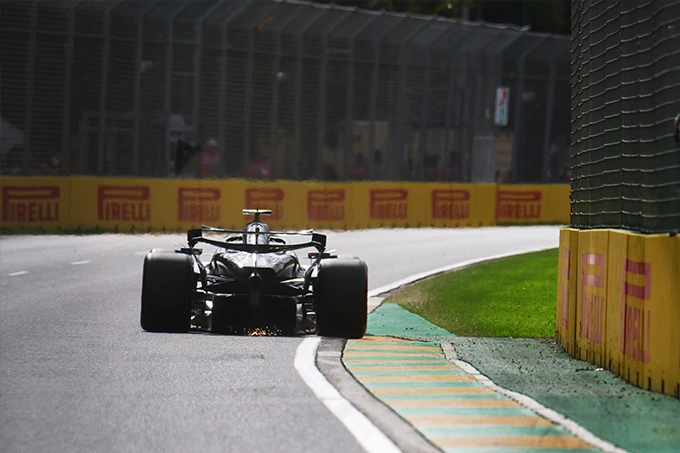Formula 1 could abandon its 2026 hybrid regulations, with serious talks underway for a V10 engine comeback by 2028. Is change coming?
Formula 1 is at a crossroads. Behind closed doors, key players in the sport are discussing a radical shift—abandoning the planned 2026 regulations and bringing back V10 engines by the start of the 2028 season.
This follows the FIA’s recent move to establish a working group to explore the feasibility of reintroducing V10 engines. The reaction from F1’s engine manufacturers has been mixed, with some questioning the relevance of such a move in today’s automotive landscape.
The 2026 Overhaul: What’s at Stake?
The current F1 engine regulations have remained largely unchanged since the introduction of hybrid V6 power units in 2014. The 2026 regulations, set to be one of the most significant changes in F1 history, include:
- 50% hybrid power integration
- Fully sustainable fuels
- Active aerodynamics
With 2025 marking the final season under the current rules, the sport is on the verge of a major transformation. But could these plans be scrapped before they even take effect?
Could 2026 Regulations Be Abandoned?
FIA President Mohammed Ben Sulayem recently hinted that a return to V10 engines—last seen in F1 in 2005—could be possible thanks to advancements in sustainable fuel technology. Now, the idea is gaining serious traction.
One proposed scenario would see the current rules extended for two more years (2026 and 2027), postponing the regulation overhaul and paving the way for a V10 comeback in 2028, powered by sustainable fuels.
Another possibility is implementing the 2026 regulations as planned but shortening their lifespan from five years to just three. This would still allow Audi F1 and Red Bull Powertrains to introduce their planned hybrid engines while keeping the door open for a V10 revival in 2028.
For this to happen, discussions must be presented to the F1 Commission, which includes all teams and power unit manufacturers. However, given the substantial investment already made into the 2026 regulations, it’s unlikely that stakeholders would vote to scrap them entirely.
Strategic Play or Genuine Plan?
The timing of these discussions suggests that the push for V10s might be more of a negotiation tactic than an imminent reality. The idea of a quick return to high-revving engines could be used to reach a middle ground between manufacturers and governing bodies.
Abandoning the 2026 rules at this stage would be highly controversial, particularly as they were designed to attract major car manufacturers like Audi, which is set to take over the Sauber team next season.
Why Bring Back the V10?
A 2028 V10 engine could offer several advantages:
- Lower Costs & Simplicity: Compared to complex hybrid power units, V10s are cheaper to develop and maintain.
- Smaller, Lighter Cars: Many in F1 have criticized the current cars for being too large and heavy.
- Independence from Big Manufacturers: If major car brands were to leave F1, private engine suppliers like Cosworth could step in with a competitive V10, reducing reliance on big corporations.
The 2008-2009 financial crisis serves as a reminder of how quickly manufacturers can exit the sport—Honda, BMW, and Toyota all left within a year. A V10 solution could act as a safety net if a similar scenario unfolds.
Who Stands to Gain?
Some believe that Ben Sulayem’s enthusiasm for the V10 comeback is partly a safeguard against potential disappointment with the 2026 rules. Others think it’s a strategic move to support Cadillac F1, which has committed to building its own engine by 2028.
Cadillac, set to use Ferrari power units in 2026 and 2027, could benefit massively from a V10 transition. Developing a naturally aspirated V10 would be far easier than competing with experienced hybrid engine manufacturers.
Manufacturers Divided on the Future
Not all teams are on board with the V10 proposal. Some insiders suggest that those pushing hardest for a delay to the 2026 regulations are manufacturers who are already behind schedule in their engine development.
Ferrari and Red Bull reportedly favor a V10 comeback, but ironically, a delay in the 2026 rules could hurt Red Bull, as the team currently lacks an engine supplier for the current regulations.
Meanwhile, Audi F1 is solely focused on its hybrid engine project for 2026, meaning a sudden shift to V10s could leave the German manufacturer in a difficult position.
A Bold Future Ahead?
While a return to V10s remains speculative, the fact that these discussions are happening at all is significant. Whether it’s a serious proposal or a strategic bargaining tool, one thing is clear—Formula 1’s future is far from settled.
- Discover More>Brown: My Dislike for Horner is ‘Genuine’”No love lost between us.”
- Discover More>Sauber F1 Heads to China Full of Confidence After Melbourne
- Follow us on >Facebook and >Twitter for F1 updates
F1 Set to Scrap 2026 Rules? V10 Comeback F1 Set to Scrap 2026 Rules? V10 Comeback F1 Set to Scrap 2026 Rules? V10 Comeback
